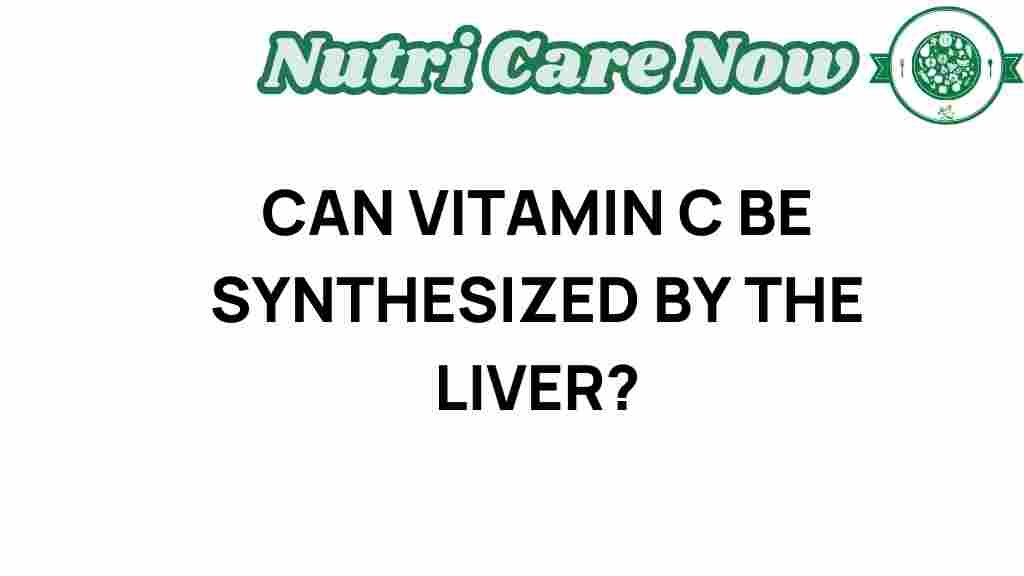Unveiling the Mystery: Can Your Liver Synthesize Vitamin C?
Vitamin C is widely renowned for its essential role in maintaining overall health and wellness. Often associated with immune function, skin health, and antioxidant properties, this vital nutrient is typically obtained through dietary sources. A common question arises: can your liver synthesize vitamin C? In this article, we delve into the fascinating relationship between the liver and vitamin C, exploring its synthesis, health benefits, dietary sources, and the implications of vitamin deficiency.
The Role of Vitamin C in Health and Wellness
Vitamin C, also known as ascorbic acid, is crucial for various physiological functions. Here are some of the key benefits:
- Antioxidant Protection: Vitamin C acts as a powerful antioxidant, neutralizing free radicals and reducing oxidative stress.
- Immune System Support: It enhances the immune response, aiding in the prevention of infections.
- Collagen Production: Vitamin C is vital for synthesizing collagen, which is essential for skin, cartilage, tendons, ligaments, and blood vessels.
- Enhancing Iron Absorption: It improves the absorption of non-heme iron, helping prevent iron deficiency anemia.
Understanding these health benefits highlights the importance of ensuring adequate vitamin C intake through diet or supplementation.
Can the Liver Synthesize Vitamin C?
In humans, the liver does not synthesize vitamin C. Unlike many animals, such as goats and certain primates, humans lack the enzyme L-gulonolactone oxidase, which is necessary for converting glucose into vitamin C. Therefore, obtaining sufficient vitamin C from dietary sources is essential for maintaining optimal health.
Dietary Sources of Vitamin C
To ensure adequate intake of vitamin C, it is important to include various dietary sources in your nutrition. Here are some excellent sources of vitamin C:
- Fruits: Oranges, strawberries, kiwi, guava, and papaya.
- Vegetables: Bell peppers, broccoli, Brussels sprouts, and spinach.
- Herbs: Fresh herbs like parsley and thyme contain significant amounts of vitamin C.
Incorporating these foods into your meals can help you meet your daily vitamin C requirements. Adult men need about 90 mg per day, while women need around 75 mg.
Understanding Vitamin Deficiency
A deficiency in vitamin C can lead to various health issues, including:
- Scurvy: A severe deficiency that results in symptoms such as fatigue, gum disease, and skin problems.
- Weakened Immune Function: Increased susceptibility to infections.
- Delayed Wound Healing: Impaired collagen synthesis can hinder recovery from injuries.
Maintaining a balanced diet rich in vitamin C is essential for preventing these health complications and promoting overall wellness.
Antioxidants and Metabolism
Vitamin C plays a significant role as an antioxidant, protecting cells from damage caused by free radicals. This protection is essential for maintaining metabolic processes and overall health. Antioxidants, including vitamin C, help fight inflammation and support a healthy metabolism by:
- Reducing Oxidative Stress: By neutralizing free radicals, vitamin C helps reduce the risk of chronic diseases.
- Supporting Energy Production: Vitamin C aids in the conversion of nutrients into energy, enhancing metabolic efficiency.
Therefore, adequate vitamin C intake is vital for those looking to maintain a healthy metabolism and overall well-being.
Step-by-Step Process to Ensure Adequate Vitamin C Intake
To maintain optimal vitamin C levels in your body, follow these steps:
- Assess Your Diet: Review your current dietary habits to identify sources of vitamin C.
- Incorporate Vitamin C-Rich Foods: Aim to include a variety of fruits and vegetables in your daily meals.
- Consider Supplements: If dietary intake is insufficient, you may consider vitamin C supplements after consulting with a healthcare professional.
- Monitor Your Health: Pay attention to any signs of deficiency and consult a healthcare provider if you experience symptoms.
Troubleshooting Tips for Vitamin C Intake
If you’re struggling to meet your vitamin C needs, consider the following tips:
- Snack on Fruits: Keep fruits like oranges and berries handy for healthy snacking.
- Try Smoothies: Blend fruits and leafy greens to create delicious smoothies packed with vitamin C.
- Cook with Herbs: Incorporate fresh herbs into your cooking to boost your vitamin C intake.
- Stay Informed: Read nutrition labels to ensure you’re aware of the vitamin C content in packaged foods.
By implementing these tips, you can easily enhance your vitamin C intake and enjoy its numerous health benefits.
The Bottom Line on Vitamin C and Liver Synthesis
To wrap up, the liver does not synthesize vitamin C, making it crucial to obtain this essential nutrient from dietary sources. The health benefits of vitamin C are extensive, ranging from antioxidant protection to improved immune function and better metabolism. Ensuring adequate intake can help prevent vitamin deficiency and support overall wellness.
For more insights on nutrition and health, check out our comprehensive guide on vitamins.
In conclusion, prioritize incorporating vitamin C-rich foods into your diet and stay informed about your nutritional needs to enhance your health and well-being.
For more information on vitamin C, you can visit this external resource.
This article is in the category Health and created by NutriCareNow Team
